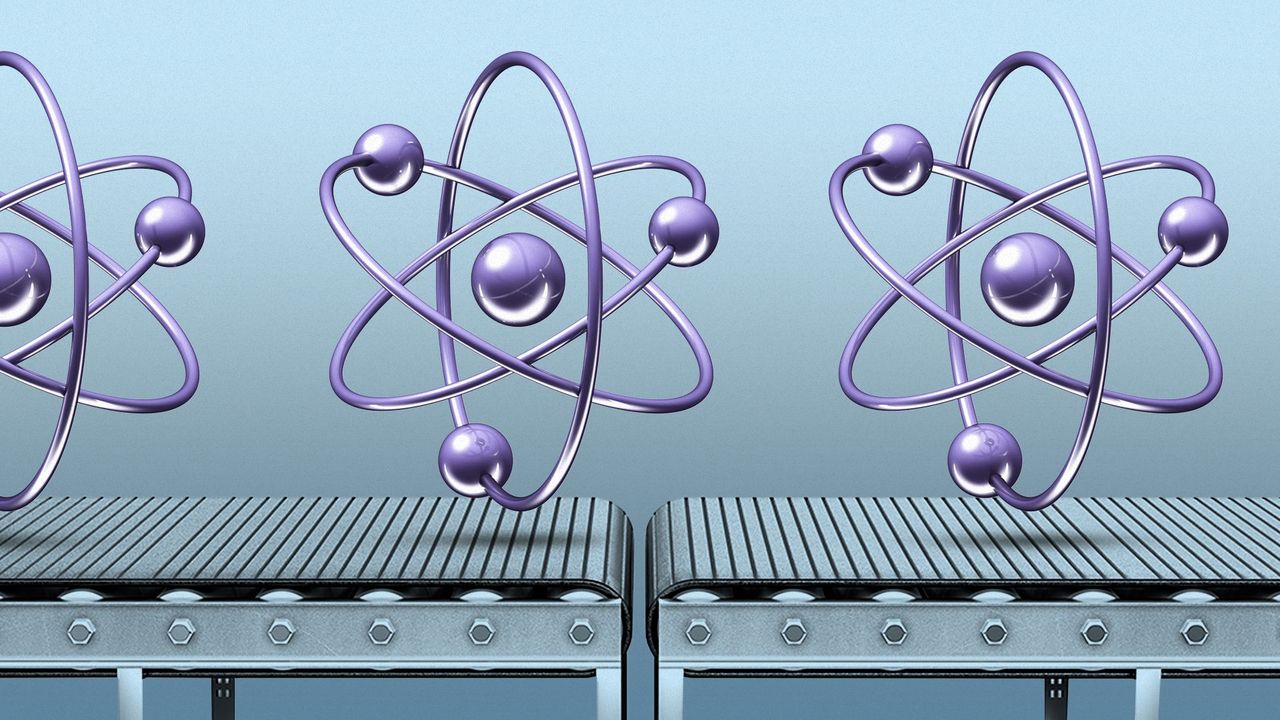
Quantum computers move closer to the assembly line
Until recently, quantum computers were essentially made-to-order products, but the industry has begun to lay the engineering groundwork for standardizing and manufacturing some of their parts.
The big picture: Quantum computers still have big hurdles to clear to fulfill the promise of outperforming traditional computers in solving some problems. They aren’t likely to come complete out of a factory but this engineering stage between research and manufacturing their parts is critical.
- It both potentially puts today’s available hardware in more hands and accelerates research on coveted high-performance quantum computers.
- “We’re in the stage where engineering is just as important as research,” says Jay Gambetta, who leads IBM’s quantum computing efforts.
Driving the news: Quantum computing company IonQ unveiled its new manufacturing facility on Thursday.
- The 100,000-square-foot facility outside of Seattle is a step toward the ultimate goal of bringing “Henry Ford kind of assembly lines to quantum,” the company’s CEO Peter Chapman says.
Where it stands: Today’s quantum computers — which are largely used for research problems, some with business goals — can’t break encryption and solve other problems researchers think (or debate) they might one day solve.
- That is generally expected to require millions of quantum bits, or qubits. The bits in a classical computer have only two states, but qubits can have many by harnessing the subatomic properties of particles.
- The power in quantum computing comes from entangling qubits, but many of them are also needed to correct the errors that come from the noise of combining many qubits — a key hurdle for quantum computers.
- Today’s largest quantum computers have fewer than 2,000 qubits.
State of play: Some of today’s quantum computers, with on the order of dozens of qubits, are transitioning from bespoke machines calibrated by physicists with screwdrivers to systems that, while there aren’t two of a kind, share some standard components or architecture. (Others remain lab experiments to try to keep pushing the boundaries of quantum computing.)
- “In the past, we would build to spec for our customer. Now we’re actually building in advance of orders,” Chapman says, adding about half the company works on “producing a manufacturable product and some infield supportable product.” IonQ recently sold two of its systems to the Air Force Research Labs.
How it works: Companies are trying to engineer the systems and standardize more of their parts so quantum computers can be built — and iterated on — faster.
- For some companies, that means fabricating components on-site. Quantum computing company Rigetti designs and manufactures its chips in-house and runs its own quantum data center, giving it “fast innovation times,” CTO David Rivas says. The company won a contract this month to deploy one of its systems at the U.K.’s National Quantum Computing Centre.
- There is also a push to shrink the footprint of the machines, which could ultimately make them cheaper. Chapman says the lasers they use are the size of a refrigerator and they are now working on getting them “down to the size of a cigar.”
- The systems that require cooling raise another pain point: “If we succeed in building a large-scale quantum computer and it takes many nuclear power plants to cool it down, we failed,” Gambetta says.
Between the lines: Ultimately, these companies want their systems to be modular so they can be connected to boost overall computing power — and so modules can be swapped out if needed.
- But scaling these systems in a modular way has to support error correction, Gambetta says. IBM, which has deployed more than 75 of its systems at other IBM facilities and their customers’ sites over the past eight years and runs its data centers, is working to connect different blocks containing qubits via quantum communication channels. They say the approach could require 10 times fewer qubits than the millions believed to be necessary for error correction.
- Clearing system architecture hurdles “could actually take care of the manufacturing problem,” Rivas says, adding that the top challenge for the industry is developing quantum algorithms.
What to watch: A burgeoning supply chain for quantum computing hardware is popping up as systems are deployed.
- There are a handful of vendors for dilution refrigerators, control systems and other components based on relatively mature technologies. Other parts that companies could conceivably go out-of-house for include electronics, attenuators and amplifiers.
- But these vendors and groups buying quantum computing systems need more government support to advance the industry, Gambetta and Rivas said.
Get more tech news in your inbox with Axios Login.
News Related-
Russian court extends detention of Wall Street Journal reporter Gershkovich until end of January
-
Russian court extends detention of Wall Street Journal reporter Evan Gershkovich, arrested on espionage charges
-
Israel's economy recovered from previous wars with Hamas, but this one might go longer, hit harder
-
Stock market today: Asian shares mixed ahead of US consumer confidence and price data
-
EXCLUSIVE: ‘Sister Wives' star Christine Brown says her kids' happy marriages inspired her leave Kody Brown
-
NBA fans roast Clippers for losing to Nuggets without Jokic, Murray, Gordon
-
Panthers-Senators brawl ends in 10-minute penalty for all players on ice
-
CNBC Daily Open: Is record Black Friday sales spike a false dawn?
-
Freed Israeli hostage describes deteriorating conditions while being held by Hamas
-
High stakes and glitz mark the vote in Paris for the 2030 World Expo host
-
Biden’s unworkable nursing rule will harm seniors
-
Jalen Hurts: We did what we needed to do when it mattered the most
-
LeBron James takes NBA all-time minutes lead in career-worst loss
-
Vikings' Kevin O'Connell to evaluate Josh Dobbs, path forward at QB
